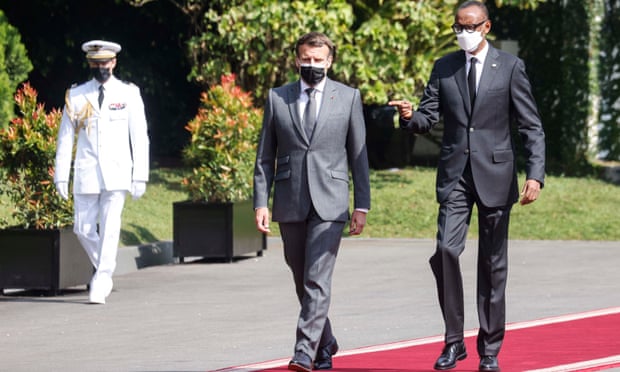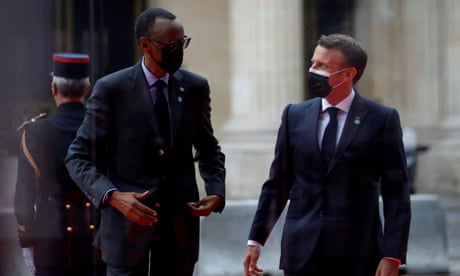International
The world is slowly waking up to Paul Kagame’s brutal actions in Rwanda.
Published
4 years agoon
By
Joe Pee
There are moments when the international community’s perception of a leader shifts into a new configuration, often for reasons that can’t be entirely logically explained. Myanmar’s Aung San Sui Kyi reached that tipping point during the Rohingya crisis, Ethiopia’s prime minister, Abiy Ahmed, has been undergoing the same transition since war broke out in Tigray, and the same process is taking place with the Rwandan president, Paul Kagame.
Today, he is welcoming the French president, Emmanuel Macron, to Kigali, his spotlessly tidy hillside capital. The visit marks the culmination of a bromance that has seen the French, once supporters of Kagame’s predecessor, Juvenal Habyarimana, make a public “mea culpa” for past support of a genocidal regime, and Kagame’s ruling Rwandan Patriotic Front (RPF), which did its best to eradicate French influence after seizing power, signal its interest in partnering up once again.

If this cynical piece of match-making is a tribute to Kagame’s skill at identifying new sources of support whenever traditional allies appear to tire, it also signals his uneasy awareness of a turning point in international relations. A leader known for harbouring grudges is only laying out the red carpet for a European power, which once charged his inner circle with shooting down Habyarimana’s plane, because he feels he can no longer count on the United States, United Kingdom and other western countries whose aid has propped up his government since 1994.
“Kagame’s star has definitely waned,” said French historian Gerard Prunier. “Ten years ago he was seen as a knight in shining armour, a wonder boy delivering development miracles. No longer.”
One reason for that shift is an increasingly visible campaign of harassment, detention, torture and assassination waged by Kagame’s intelligence services for more than a decade, which has crushed freedom of speech at home and pushed dissent into exile.
The fact that many of the regime’s targets have not been members of the Hutu majority but Kagame’s own Tutsi minority – many of them formerly trusted insiders at that – has not gone unremarked in the west. Despite his loyalists’ best efforts, it has become increasingly difficult to convincingly portray these “enemies of the state” as extremists bent on completing an unfinished mass extermination campaign.
Two cases in particular helped shift the dial. One was the treatment meted out to the family of the Tutsi industrialist and RPF funder, Assinapol Rwigara, killed in a suspicious car accident in 2015. When his daughter Diane said she would run for the 2017 presidential elections, not only was she charged with forging registration papers – making it impossible for her to stand – but her mother was jailed. The family’s hotel was razed to the ground, its assets auctioned.
The other was the 2020 death in detention of the gospel singer Kizito Mihigo. A Tutsi genocide survivor, Kizito was jailed after calling in his songs for Rwanda’s yearly commemoration of its dead to embrace Hutu victims of RPF killings – a taboo notion in Rwanda. Few Rwandans believe the official explanation that Kizito took his own life in his cell.
Analysts say these episodes have done more damage to Rwanda’s image than the RPF’s role in the mass killings of Hutus who had fled into the Democratic Republic of the Congo in the late 1990s; its murder of former head of intelligence Patrick Karegeya, found strangled in a South African hotel in 2014; or its repeated attempts on the life of General Kayumba Nyamwasa, the exiled former head of the armed forces.
“You can kill hundreds of thousands without it having much international impact, but jail an elderly mother, and it changes forever the way allies see you,” commented Prunier.
If “Rwigara” and “Kizito” are hardly household names outside Rwanda, Paul Rusesabagina, the inspiration for the Hotel Rwanda film, is. His rendition from Texas last August was celebrated in Rwanda, with Kagame chortling on television that the operation that lured him on to a jet in Dubai and flew him to Kigali to face terrorism charges had been “flawless”. But in reputational terms, the operation may well have backfired.
“A lot of US senators who only knew one thing about Rwanda – that this man was Africa’s Schindler – were left wondering what on earth was going on,” said one European diplomat.
For years western development experts uneasily offset revelations of disappearances and extra-judicial killings in Rwanda against its stellar performance on GDP growth and the sustainable development goals. But that deal is looking increasingly wobbly as economists query the credibility of Rwanda’s figures.
“The Faustian bargain Kagame struck with donors – ‘overlook my brutal behaviour and I’ll give you an African model for economic growth’ – has been exposed as a fantasy,” said former presidential adviser David Himbara from exile in Canada.
The final ingredient in this recalibration has been Joe Biden’s election as US president. An administration whose policy on Africa was encapsulated by Trump’s crass “s***hole countries” comment has now been replaced by one signalling its seriousness on human rights.
“That’s allowing old hands at the state department who have followed Rwanda for decades to get a hearing once again,” commented one European diplomat. “And they have plenty of concerns about Kagame.”
In February, Rwandan officials attending the Universal Periodic Review in Geneva seemed taken aback by the bluntness of the human rights concerns aired by US and UK delegates. Kagame was not included among the five African presidents invited to Biden’s climate summit in April, and Rwanda was bypassed on Secretary of State Anthony Blinken’s virtual visit to Africa.
A lot of this recalibration can be explained by the sheer passage of time. Kagame has now been at the helm for 27 years, and such longevity carries its own message. As one development official told me: “Anyone who is in power that long, well, you have to regard them as a dictator, don’t you?”
You may like
-


Video: Nana Tonardo Sprays Cash on Nana Agradaa During Church Visit
-


Juliet Ibrahim Champions Gender Equality with HER STEAM Initiative
-


Video: Funny Face Flees After Learning Lady Shares Name with His Ex
-


Video: Lisa Quama Revives Ghana’s Independence Spirit with Stirring Nkrumah Reenactment
-


Tiwa Savage Eyes Mogul Status with Bold Plans for Music and Film Industry Expansion
-


The 28th February Crossroads Shooting: The Spark That Ignited Ghana’s Independence
-


Mahama Vows to Usher in Era of Fiscal Discipline and National Renewal
-


Elon Musk changes his name to Kekius Maximus on X
-


Mahama Calls for Unity Among Political Parties to Drive Ghana’s Renaissance
















